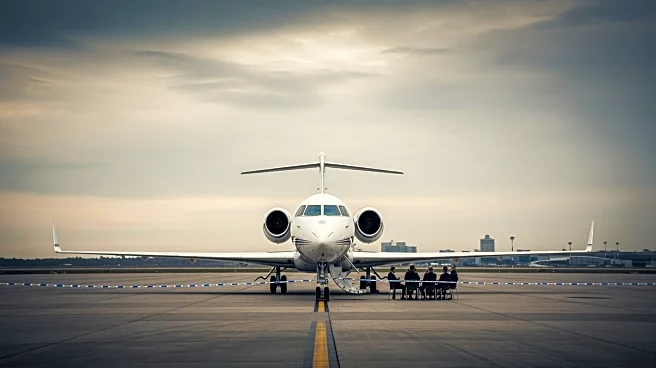What's Happening?
The Federal Aviation Administration (FAA) has imposed a ban on private jets landing at 12 major U.S. airports, including JFK International and Newark Liberty, due to a shortage of air traffic controllers caused by the ongoing government shutdown. The National
Business Aviation Association (NBAA) has criticized the decision, stating it severely impacts general aviation, which supports over a million jobs and contributes $340 billion to the economy. The ban affects airports such as Los Angeles, Chicago O'Hare, Houston, Atlanta, Denver, Dallas-Fort Worth, and Ronald Reagan Washington National. While private jets can still operate at secondary airports like LaGuardia and Teterboro, delays and diversions are occurring due to the staffing crisis.
Why It's Important?
The FAA's decision to restrict private jet operations at major airports highlights the severe impact of the government shutdown on the aviation industry. This move disproportionately affects general aviation, which plays a crucial role in the U.S. economy by providing jobs and supporting humanitarian flights. The restrictions could lead to significant economic losses and operational challenges for businesses relying on private aviation. The situation underscores the broader consequences of the shutdown, affecting not only commercial air travel but also private and business aviation sectors.
What's Next?
The NBAA has joined the Modern Skies Coalition to advocate for an immediate end to the government shutdown. While negotiations between Senate Democrats and Republicans are underway, it may take several days for air traffic operations to normalize. Transportation Secretary Sean Duffy has warned that even if a deal is reached soon, the recovery process for air traffic control staffing and operations will be gradual, potentially prolonging disruptions in air travel.
Beyond the Headlines
The ban on private jets at major airports raises questions about the prioritization of air traffic resources during crises. It highlights the vulnerability of the aviation sector to political and administrative disruptions, prompting discussions on contingency planning and resource allocation. The situation may lead to long-term changes in how air traffic control staffing is managed during government shutdowns.















